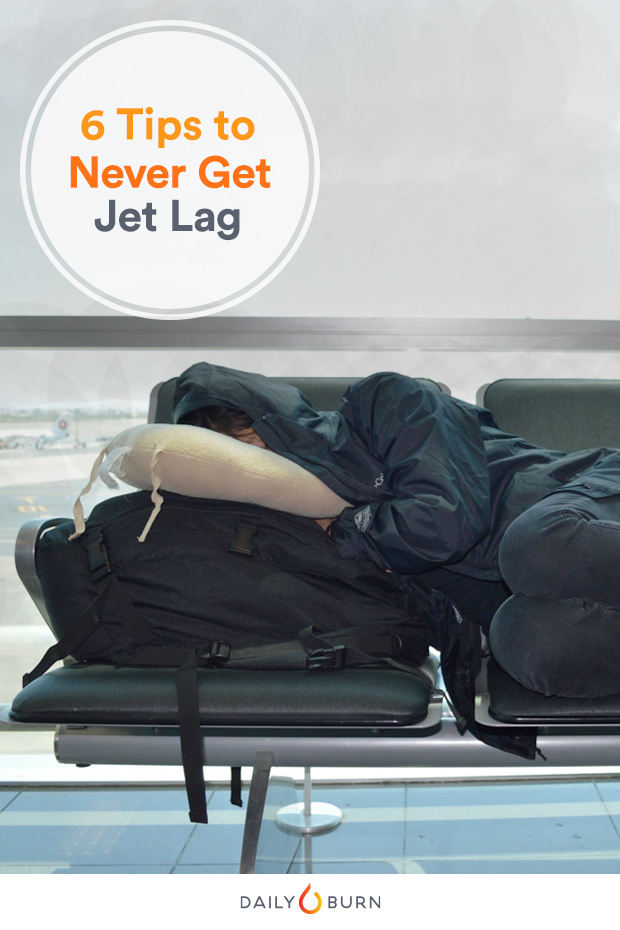
Whether you’re a frequent business traveler, weekend adventurer, or find yourself away from home just once a year, it’s not easy to get your best night’s sleep when you’re not in your own bed. And if you’re in a different time zone, forget it. To help you catch more zzz’s so you can make the most of your waking time, here are tried-and-true tips from frequent travelers and sleep experts to set you up for slumber success.
RELATED: 7 Reasons to Take Every Last Vacation Day This Year
How to Sleep Better and Skip the Jet Lag
1. Adjust to your new time zone before you arrive.
Jet lag tends to worsen with the number of time zones you cross, so pre-planning your sleep schedule is crucial, says Gary K. Zammit, PhD, executive director at the Sleep Disorders Institute in Manhattan. Try to get in sync with your new time zone as soon as possible.
“I get the best night’s sleep when I adjust my body clock to the time zone of my destination a few days prior to traveling,” says Bob Jacobs, vice president of brand management for Westin. “If I’m traveling West in a few days after being on the East coast, I’ll stay up an hour or so later at night. And if I’m going to the East coast after being out West, I’ll start getting up a bit earlier each day.” Then, keep your dozing schedule as stable as possible in your new destination. Dimming your lights in the evening hours and opening shades for some bright light exposure in the early a.m. may also help, Zammit says.
RELATED: Can Changing Time Zones Affect Your Health?
2. Pack smart.
Make your destination feel like home to minimize the impact of sleeping in an unfamiliar environment, suggests Zammit. Bring your favorite pajamas and pack your pillow or pillowcase, too. Still can’t unwind? Consider picking up a lavender-scented essential oil to spritz at night or to dab on your pillow. Research has found that lavender may have a positive effect on insomnia and depression.
For business traveler Christina Lampe, packing for maximum hotel room comfort is her number one priority. “You never know how loud, bright, warm or cold a hotel room will be until you get there,” she says. “I always bring a blackout eye mask, earplugs or noise-canceling headphones, and two types of pajamas in case my room is too hot or too cold. I find that I sleep better when I control the environment to make it feel like it does at home,” she says.
RELATED: 6 Signs That You’re Exhausted (Not Just Tired)
3. Stick to your usual routine.
“Whether I arrive at my hotel at noon or midnight, I keep my routine consistent so I feel settled and ready,” says Chelsea Kay Jones, of Forest Lake, Minn. Jones has worked as a Delta flight attendant for six years. “I iron and hang up my uniform for the next day, unpack my toiletries and lay them out by the sink, set up my hair products and makeup for the next day, then put anything back in my suitcase I won’t be needing.” Sticking to your usual before-bed rituals — like reading — can help you feel more comfortable, too.
4. Get moving.
Being active during the day and avoiding naps is helpful for most people, especially if you can get outside and benefit from light exposure, says Zammit. Taking a quick shower in his hotel room, then putting on fresh clothes and going outside helps James Shillinglaw, Editor-in-Chief of TravAlliance Media, adjust to his new environment and time zone. Going for a quick run when he arrives at his destination also keeps his energy levels high throughout the day, and enables him to fall asleep faster and sleep more soundly that night.
RELATED: 10 Unexpected Things That Can Ruin Your Sleep
5. Be mindful of your travel diet.
Try not to fall into “vacation eating” mode, chowing down on heavy, greasy foods, suggests Jones. “If you’re hungry, have a light snack before bed and make sure the snack doesn’t contain caffeine or chocolate, which can keep you up at night,” says Zammit. Beware of foods and drinks that might cause acid reflux, like orange juice, tomato juice or spicy foods. Instead, nosh on something simple and light, like cereal and milk or applesauce. If you’ve got a few hours before bed, eating high-glycemic carbs (like pasta or pretzels) may also help you fall asleep faster, according to research.
Take a hard look at your drinking habits, too. Since she’s constantly going from dehydrating airplanes to hotels rooms that tend to circulate dry air, Jones says she drinks a ton of water on travel days and skips caffeinated drinks later in the day so they don’t hamper her slumber.
RELATED: 10 Simple Snacks for Better Sleep
6. Get up if you can’t fall asleep.
“If I wake up in the middle of the night, I get up and do something, like read or watch TV,” says Shillinglaw. “I try not to just lie there when I find myself awake. I get out of bed, do something productive, and then go back to sleep in an hour.” Most experts agree that if you wake up and can’t fall back asleep within 15 to 20 minutes, you should get out of bed and do something else. You’ll drift off again later, and your body will thank you the next day.
Want more tips to avoid jet leg keeping it au natural? Check out this handy infographic from the team at Expedia.

